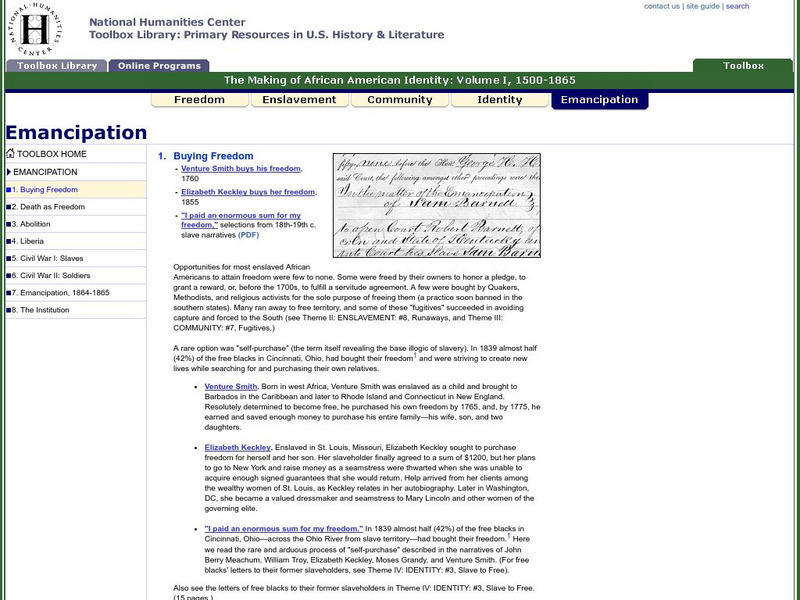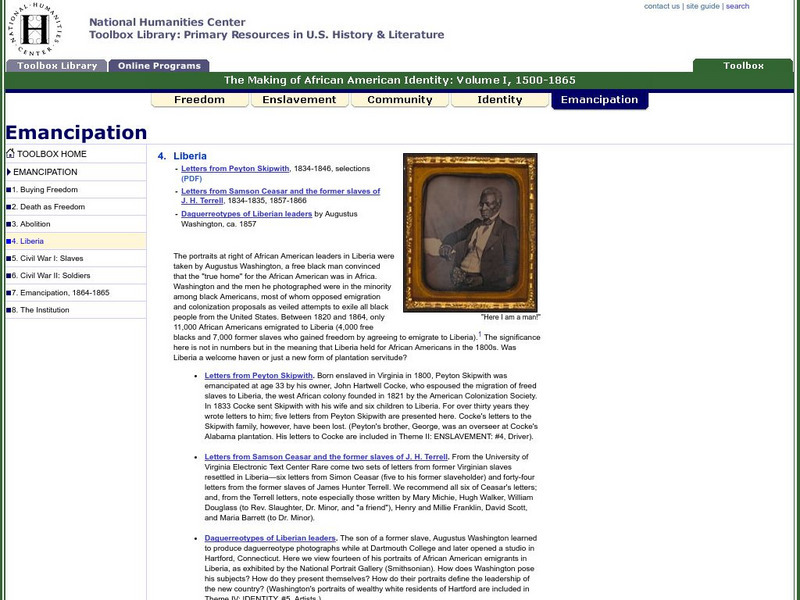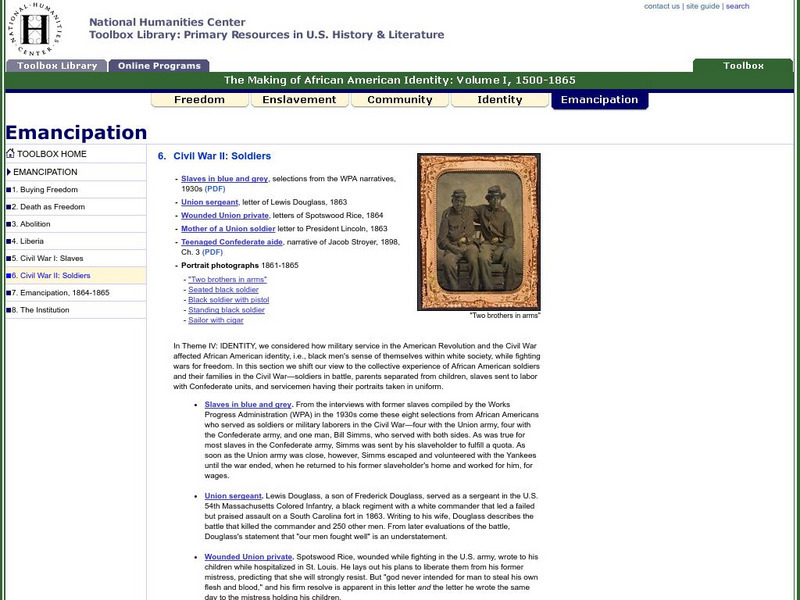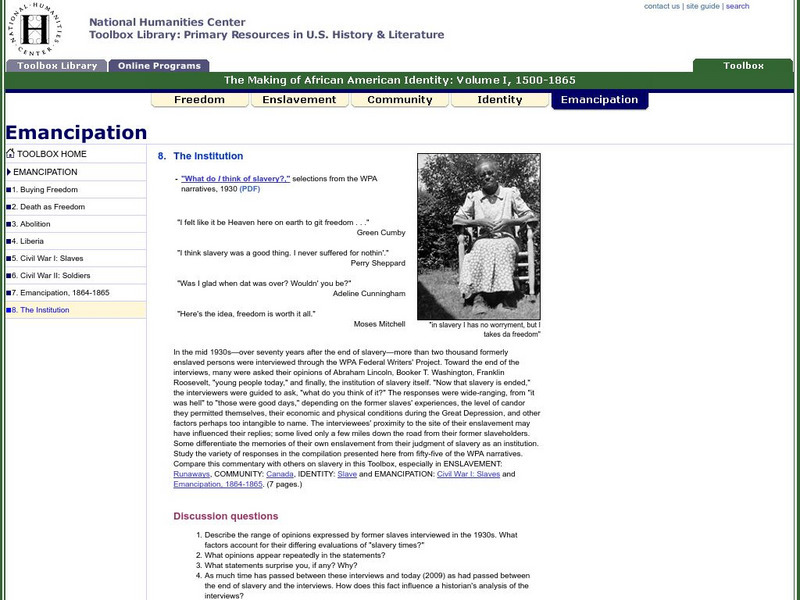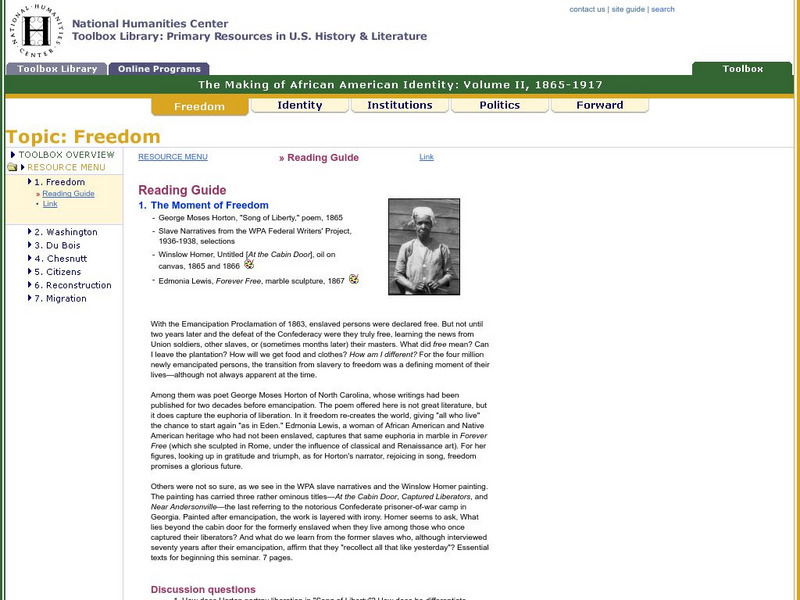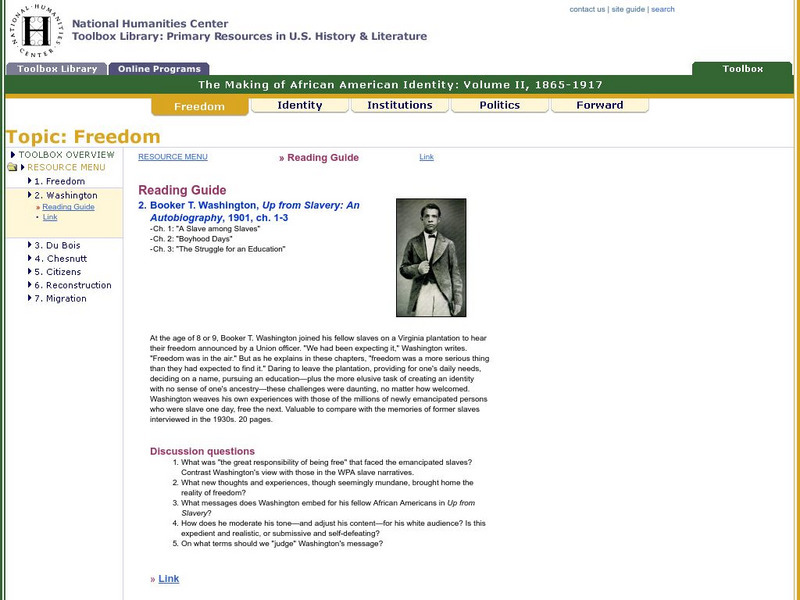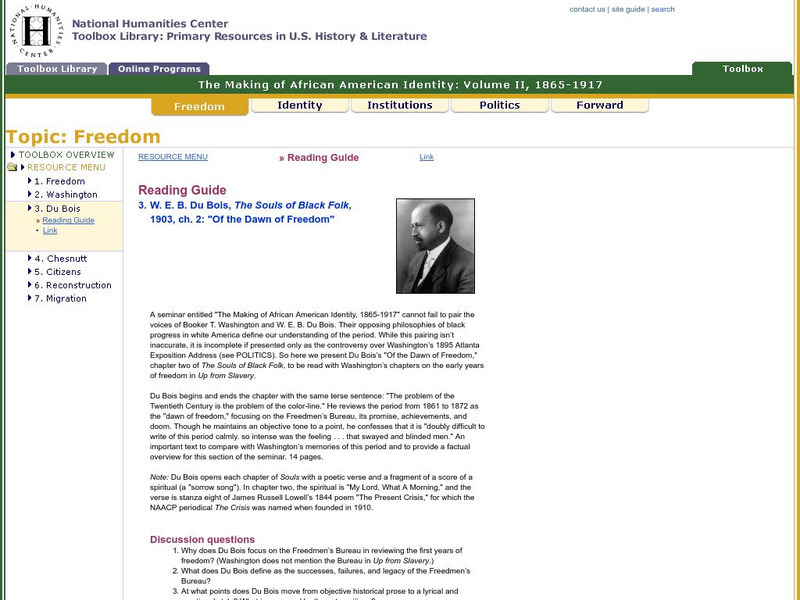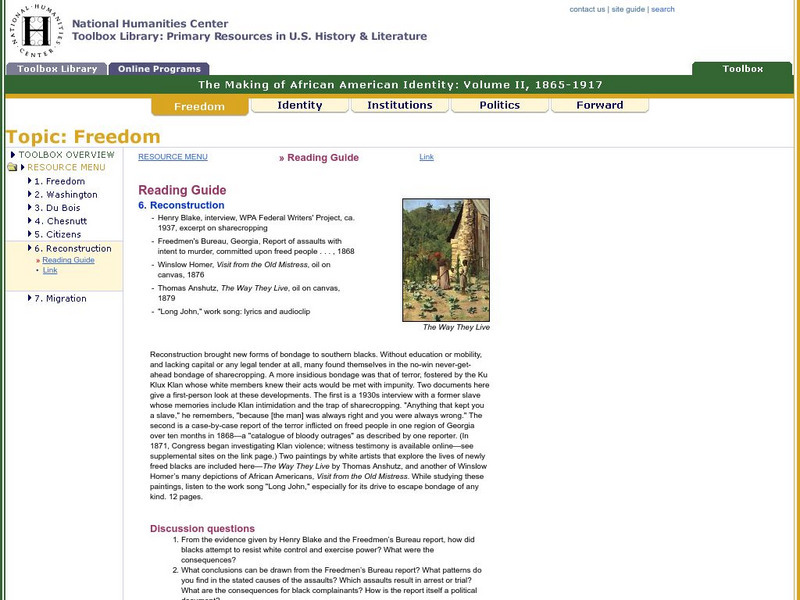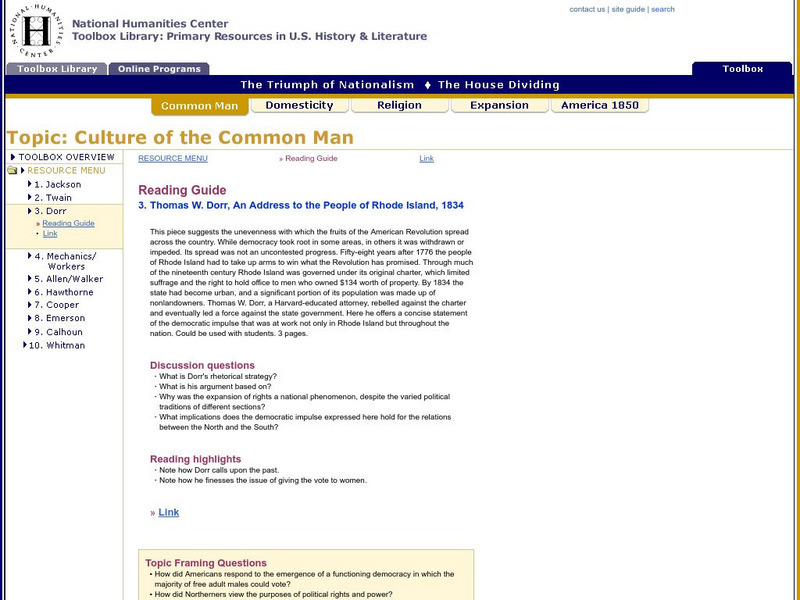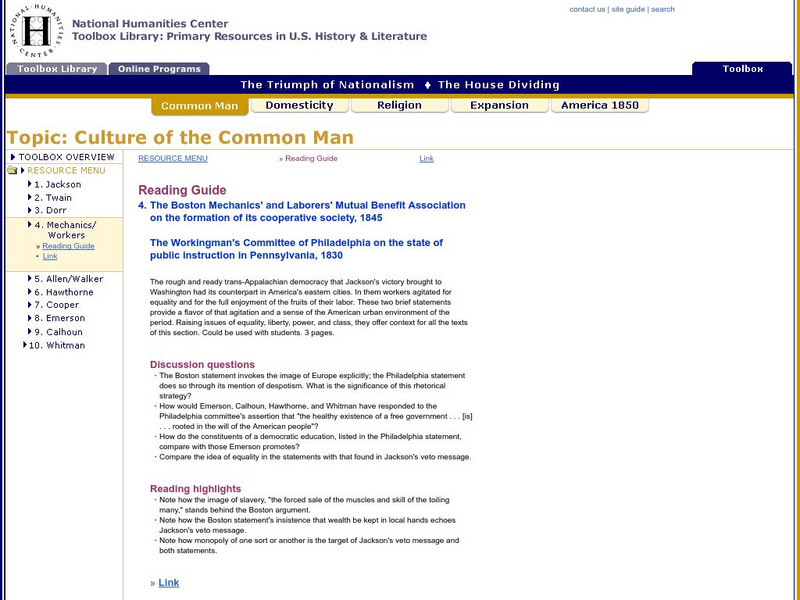Hi, what do you want to do?
National Humanities Center
National Humanities Center: Toolbox Library: Education, Making of African American Identity: V. 1
Nineteenth-century accounts and twentieth-century recollections by former slaves of the absence of and obstacles to education for African Americans. Links to narratives of freed and newly freed slaves are provided.
National Humanities Center
National Humanities Center: Toolbox Library: Citizenship, Making of African American Identity: V. 1
Public addresses, letters, and narratives about the absence of and the need for citizenship rights for African Americans. Links to resources used to lobby for equal rights are provided at the top of the page.
National Humanities Center
National Humanities Center: Toolbox Library: Making of African American Identity: Emigration
Proposals for and arguments against the emigration of blacks to Haiti and to Africa during the mid-nineteenth century. The struggle of African Americans, such as Martin Delany, to determine the appropriate course of action with this...
National Humanities Center
National Humanities Center: Toolbox Library: Emancipation, 1864 1865
Letters and narratives of slaves freed at the end of the Civil War. An interesting look at the confusion and eagerness which confronted these newly freed Americans.
National Humanities Center
National Humanities Center: Toolbox Library: Buying Freedom, Making of African American Identity: V. 1
Narratives from the eighteenth to the twentieth centuries depicting the struggle by blacks to purchase their own freedom and the impediments they faced.
National Humanities Center
National Humanities Center: Toolbox Library: Emancipation: Death as Freedom
A poem, narratives, and newspaper selections that examine black suicide and death generally as the only dependable source of freedom for slaves. This grim resource provides links to two separate accounts of these experiences.
National Humanities Center
National Humanities Center: Toolbox Library: Emancipation: Abolition
Speeches, songs, letters, and pamphlets from the early- and mid-nineteenth century promoting the abolition of slavery and emancipation of enslaved peoples are provided within this resource.
National Humanities Center
National Humanities Center: Toolbox Library: Emancipation: Liberia, Making of African American Identity: V. 1
Primary resource provides letters, statements, and photographs of free and enslaved African Americans who journeyed to Liberia to establish new lives and identities. Also includes questions for class discussion.
National Humanities Center
National Humanities Center: Toolbox Library: Civil War I: Slaves, Making of African American Identity: V. 1
Photographs of slaves during the Civil War and war memories of former slaves during that conflict. Links to two separate resources can be found here, each focusing on the war memories of former slaves.
National Humanities Center
National Humanities Center: Toolbox Library: Emancipation: Civil War Ii: Soldiers
Photographs of and letters from slaves and former slaves who fought for the Union or were forced to fight for the Confederacy during the Civil War.
National Humanities Center
National Humanities Center: Toolbox Library: The Institution, Making of African American Identity: V. 1
Interviews from the 1930s that reflect on African Americans' experience of the institution of slavery. A narrative with firsthands accounts is linked within this resource.
National Humanities Center
National Humanities Center: Toolbox Library: The Moment of Freedom: Making African American Identity
For the four million newly emancipated persons, the transition from slavery to freedom was a defining moment of their lives?although not always apparent at the time. This resource provides texts that explore what freedom meant to African...
National Humanities Center
National Humanities Center: Toolbox Library: Booker T. Washington, Making of African American Identity: V. 2
A summary and questions related to an autobiography in which Booker T. Washington describes his early experience of freedom. A link to this full text is provided here as well.
National Humanities Center
National Humanities Center: Toolbox Library: W. E. B. Du Bois, Making of African American Identity: V. 2
Chapter in which W. E. B. Du Bois examines the state of African Americans between 1861 and 1872. He reviews the period from 1861 to 1872 as the "dawn of freedom," focusing on the Freedmen's Bureau, its promise, achievements, and doom.
National Humanities Center
National Humanities Center: Toolbox Library: Freedom: Charles W. Chesnutt: African American Identity
Short story that explores the cultural and linguistic resources that sustained African Americans in the first years of freedom. This resource focuses on Charles Chesnutt and the influence he achieved by writing about race for a white...
National Humanities Center
National Humanities Center: Toolbox Library: Reconstruction: African American Identity: 1865 1917
An interview, government reports, two paintings, and a work song that explore the constraints placed upon African American freedom in the late-nineteenth century as a result of reconstruction.
National Humanities Center
National Humanities Center: Toolbox Library: The Making of African American Identity: Vol. Ii, 1865 1917: Migration
Congressional testimony and a letter that explore late nineteenth-century black migration from the South. Links to both resources are provided within this site.
National Humanities Center
National Humanities Center: Toolbox Library: The Triumph of Nationalism: House Dividing: America, 1815 1850
A collection of forty-four primary resources including historical documents, literary texts, visual images, and maps, illuminated and contextualized by notes, thematic questions, and text-specific discussion questions for classroom...
National Humanities Center
National Humanities Center: Toolbox Library: Triumph of Nationalism: Culture of the Common Man
A collection of twelve primary resources, primarily from American literature, that addresses questions about how the United States could function as a democracy, and differences between the concepts of the North and the South concerning...
National Humanities Center
National Humanities Center: Toolbox Library: Andrew Jackson: Triumph of Nationalism: America, 1815 1850
A presidential message detailing Jackson's view that the Bank of the U.S. is unconstitutional and is a monopolistic threat to common citizens. A link to this message is provided as well as questions for discussion.
National Humanities Center
National Humanities Center: Toolbox Library: Mark Twain, Triumph of Nationalism: America, 1815 1850
Two chapters from Huckleberry Finn that offer portraits of "ordinary folks" during the Jacksonian era.
National Humanities Center
National Humanities Center: Toolbox Library: Thomas W. Dorr, an Address to the People of Rhode Island, 1834
An 1834 speech that calls citizens to rise up against anti-democratic values in Rhode Island including property requirement to vote.
National Humanities Center
National Humanities Center: Toolbox Library: Mechanics/workers, Triumph of Nationalism: America, 1815 1850
Two statements issued by workers' groups advocating greater equality for all who labor.
National Humanities Center
National Humanities Center: Toolbox Library: Culture of the Common Man: R. Allen & D. Walker
National Humanities Center collection of primary source material includes selection by Richard Allen, Confession of John Joyce, 1808, and excerpts from David Walker's Appeal, 1830. With questions for discussion.









